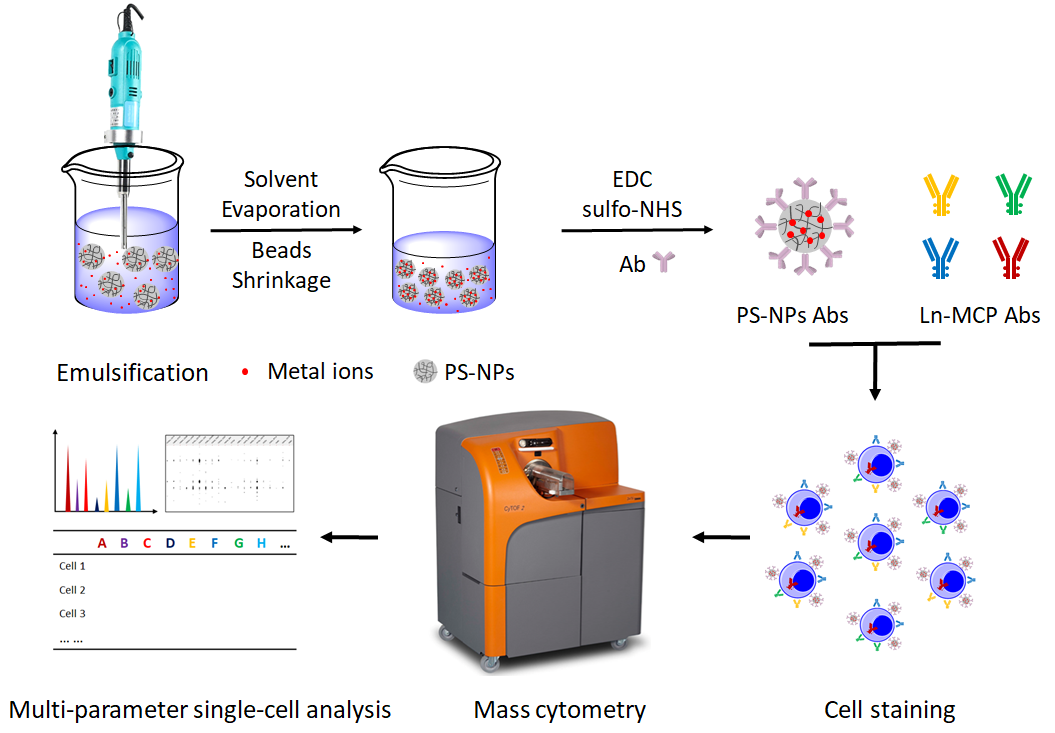Recently, a new metal labeling strategy has been suggested by researchers from the Suzhou Institute of Biomedical Engineering and Technology (SIBET) of the Chinese Academy of Sciences (CAS) to boost mass cytometry’s sensitivity and increase the number of MC detection channels.
 Schematic illustration of metal doped PS-NP_Abs mass tags synthesis and MC assay. Image Credit: SIBET
Schematic illustration of metal doped PS-NP_Abs mass tags synthesis and MC assay. Image Credit: SIBET
MC is a new bioanalytical method for simultaneously examining high-dimensional biomarkers on individual cells.
By employing heavy metal isotope-labeled antibodies (Abs) to stain cells, MC eliminates the spectral overlap and auto-fluorescence phenomena that severely restrict the highly multiplexed capabilities of conventional fluorescence flow cytometry (FCM) and theoretically enables the measurement and quantification of up to 135 markers with single-cell resolution.
The absence of suitable metal isotope trapping supports has prevented the implementation of more than 60% of the isotope channels. Therefore, there are still numerous challenges with a new method to synthesize MC mass tags.
The method used in this work by researchers under the direction of Prof. Pengli Bai is based on the application of polystyrene nanoparticles (PS-NPs), a conventional material, to transport metals (rare earths, Zr, and Hf), and associate with antibodies.
Several nanoparticle-based MC mass tags have been found to improve sensitivity and widen MC detection channels at present. Nevertheless, to minimize the random binding of mass tags to cells, the majority of them require complicated surface modifications during probe preparation.
Zhizhou Liu and his colleagues in Bai's lab proposed a universal method to synthesize MC mass tags by using polystyrene nanoparticles as metal carriers.
For the first time, MC now includes four additional MC detection channels (177Hf, 178Hf, 179Hf, and 180Hf).
The metal@PS-NP_Abs mass tags can effectively distinguish distinct subpopulations of human mononuclear cells when used in conjunction with widely available metal chelating polymer (MCP) mass tags. In comparison to MCP mass tags, the new mass tag showed a five-fold increase in sensitivity.
Furthermore, a new approach to the reduction of nonspecific binding was reported by utilizing a new cell staining solution rather than the complex surface modification and stringent size control employed in other mass tag design strategies.
Additionally, for highly multiplexed detection of human MNCs biomarkers, these PS-NPs-based mass tags exhibited a strong affinity with commercial MCP-Abs.
We believe that more kinds of PS-NPs with different metals would be prepared for MC metal tags, and dual-functionality probes for both FCM and MC can be achieved if appropriate dyes were swelling to the PS-NPs along with metal ions, which can be used in both MC and flow cytometry or imaging.”
Zhizhou Liu, Study First Author, Suzhou Institute of Biomedical Engineering and Technology, Chinese Academy of Sciences
Source:
Journal reference:
Liu, Z., et al. (2023). A universal mass tag based on polystyrene nanoparticles for single-cell multiplexing with mass cytometry. Journal of Colloid and Interface Science. doi.org/10.1016/j.jcis.2023.02.092